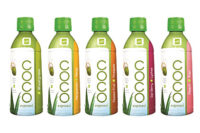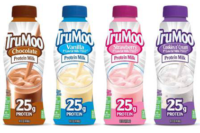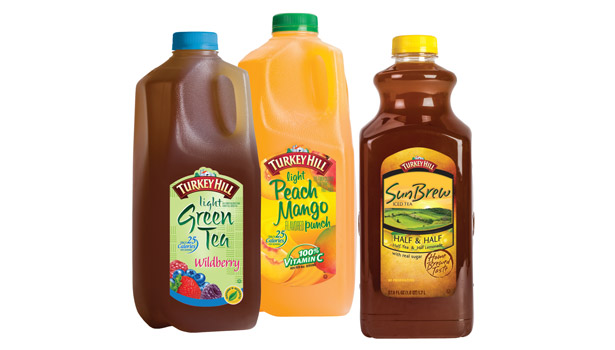The focus is on flavor and function in nondairy beverages
Processors like Turkey Hill are focusing on unique tea flavors and more options. Lipton introduces healthier teas, and Good Belly goes with functional ingredients, a trend many other beverage makers are following.

The drive-in chain restaurant Sonic launched a line of freshly brewed green iced teas.

Turkey Hill focuses on healthy options with three new light products. Plus, following the trend it adds a new half lemonade, half tea option.

For the 52 weeks ended Feb. 24, 2013. Total United States — Total U.S. multi-outlet (supermarkets, drugstores, mass market retailers, military commissaries and select club and dollar retail chains). Source: Information Resources Inc. (IRI), a Chicago-based market research firm.

For the 52 weeks ended Feb. 24, 2013. Total United States — Total U.S. multi-outlet (supermarkets, drugstores, mass market retailers, military commissaries and select club and dollar retail chains). Source: Information Resources Inc. (IRI), a Chicago-based market research firm.


For the 52 weeks ended Feb. 24, 2013. Total United States — Total U.S. multi-outlet (supermarkets, drugstores, mass market retailers, military commissaries and select club and dollar retail chains). Source: Information Resources Inc. (IRI), a Chicago-based market research firm.

Fave is a 100% fruit and vegetable juice that contains three full servings of vegetables in each 8-ounce glass. Each serving is only 60 calories.

Good Belly introduced its newest flavor, Carrot Ginger, and also new gluten-free family-sized quarts.

For the 52 weeks ended Feb. 24, 2013. Total United States — Total U.S. multi-outlet (supermarkets, drugstores, mass market retailers, military commissaries and select club and dollar retail chains). Source: Information Resources Inc. (IRI), a Chicago-based market research firm.











Iced teas, juices, lemonades and other hydrating beverages are taking on all manner of flavors and functions, from pure beverage enjoyment to drinks that have added functional ingredients.
One dairy processor that’s having plenty of success with refrigerated teas is Turkey Hill, Conestoga, Pa. The company added six products to its line this year. All Natural Lemonade, Sun Brew Lightly Sweetened Peach Tea and Sun Brew Half & Half Tea (half lemonade, half tea) are sold in 57.6-ounce bottles. Three new light options, sold in 64-ounce bottles, put the focus on even healthier alternatives. The new flavors are — Limited Edition Light Wildberry Punch, Light Peach Mango Punch (25 calories and 5 grams of sugar per cup) and Light Wildberry Green Tea (25 calories, 6 grams of sugar). Keeping it healthy is an ongoing goal for Turkey Hill. “We fortify our fruit drinks with Vitamin C and are constantly exploring other attributes that may add value for our customers,” said Jonathan Eubanks, Turkey Hill market analyst.
Consumers are going beyond the grocery store for their tea fix as well. Tea is also popping up in restaurants. Chicago-based Technomic shows the number of iced teas showing up on restaurant menus is up by 6%, according to its MenuMonitor menu-tracking resource.
Following that trend, the drive-in chain restaurant Sonic has launched a new line of freshly brewed green iced teas available in thousands of flavors, including five brand-new flavor mix-ins — peach, mango, raspberry, blackberry and mint. These mix-ins and the diet green iced teas are sugar-free and sweetened with Splenda, and contain no artificial flavors or colors. The new iced teas and flavors can be used to combine into various blends.
Nondairy beverages by the numbers
Flavor trends in iced tea |
Source: Beverage makers, compiled by Dairy Foods |
Besides iced tea, processors are looking at growing the juice market as well. Refrigerated juices and drinks, with $6 billion in sales, is a large category of nondairy beverages. Many segments within this category saw sales struggle in the last year, but a few have surged ahead from the pack. On the refrigerated tea and coffee side, dollar and unit sales are soaring.
In the 52 weeks ended Feb. 24, 2013, the refrigerated juices/drinks category saw dollar sales rise 2.8% to $6 billion, and units increase a slight 0.4%, according to data from Information Resources Inc. (IRI), Chicago. Most segments in this category saw units drop, but a few had very promising numbers. The refrigerated cranberry cocktail/drink segment saw a staggering 517.9% jump in unit sales and dollar sales rose 540.3%. Also successful, the refrigerated juice and drink smoothies segment saw units go up 36.5% and dollar sales up 37.9%. The refrigerated vegetable juice/cocktail segment also had success: units were up 20.1% and dollar sales rose 18.6%. (See table.)
The success of vegetable juices suggests consumers are looking for lower-sugar juice alternatives with added benefits from the extra vegetable servings. Smoothies could be gaining popularity as meal replacement options.
Meanwhile, in the same timeline as above, the refrigerated teas/coffee category showed unit sales up 19.5% and dollar sales up 29%. The refrigerated ready-to-drink (RTD) coffee segment saw a 287.8% unit sales jump, and the refrigerated tea segment saw a 10.6% unit sales jump. (See table.)
According to Chicago-based Mintel, the United States tea and RTD tea market grew 1.9% in 2012. In addition, RTD tea accounts for close to 60% of the U.S. tea and RTD tea market, with sales of nearly $4 billion in 2012.
Tea time
Another dairy processor keeping on top of tea trends is Guida’s Dairy, New Britain, Conn., part of Dairy Farmers of America, Kansas City, Mo. In March, the company had just begun to expand its tea flavor offerings, and is working on new taste profiles. It currently produces gallons and half-gallons of iced tea and half-gallons of diet iced tea and iced green tea.
Iced tea is one of the fastest-growing nondairy products in the dairy case right now, with lots of growth potential, according to Jim Guida, executive vice president of Guida’s Dairy. From the Turkey Hill brand to the Fuze brand, “Brands of tea have just taken off. People like tea, and it’s a popular alternate that people are getting out of the dairy case,” he said.
Guida’s is also getting ready to announce a partnership with a national brand to co-pack a new iced tea and fruit drink line.
Also launching new tea products and targeting the health-conscious market is Unilever-owned Lipton, Englewood Cliffs, N.J. As part of the Pepsi/Lipton Tea partnership, a joint venture between PepsiCo and Unilever, the Lipton brand launched Lipton Diet Green Tea Honey Ginseng and Lipton Half & Half Tea (a combination of tea and lemonade). The new products bring together healthy options with unique flavors. The teas are sold in 12-packs of 16-ounce bottles for a suggested retail price of $5.99.
Kevin Miller, vice president of marketing for Old Orchard Brands, Sparta, Mich., also noted that the ready-to-drink tea category continues to grow. To respond to that trend, the company introduced a new line of sweet teas from concentrate for the frozen section. The two flavors are Southern Style (lightly sweetened black tea) and Half & Half (sweet tea and lemonade). The teas are sold in 12-ounce cans with a suggested retail price $1.49 per package.
Brookshire Grocery Co. Manufacturing, Tyler, Texas, is another company focusing on new tea flavors. The company introduced Red Diamond Sweet Raspberry Tea and Red Diamond Lemon Tea to its line this year. The teas are available in pint and half-gallon sizes. The products can be found in all Brookshire’s, Super 1 Foods and Fresh by Brookshire’s.
Focusing on functional
Ice cream flavors influence coffee drinks |
|
Tea and juice processors aren’t the only ones getting innovative with flavors. Coffee makers are focusing on indulgent and bold flavors as well. Dunkin’ Donuts partnered with its sister brand, Baskin-Robbins to introduce two new flavors of iced coffee. Mint Chocolate Chip and Old Fashioned Butter Pecan are inspired by the classic Baskin-Robbins ice cream. “Consumers today seem to move rather easily among three prominent trends: comfort, celebration and bold new flavors,” said Stan Frankenthaler, executive chef and vice president of Product Innovation at Dunkin’ Brands. He said the company is also focusing on developing more beverages with seasonal tie-ins. This is the first time Dunkin’ Donuts partnered with its sister brand for a product along these lines, according to the company. Both iced coffee flavors are available through spring and into the summer at participating Dunkin’ Donuts restaurants nationwide. Earlier this year the company also introduced dark chocolate mocha and Irish crème flavors in its coffee, lattes and frozen coffee options. |
Beverages that are both appealing to taste buds and offer healthy qualities continue to be the focus for many beverage processors, especially with more consumers concerned over their sugar and calorie intake. Several innovative products focusing on functional and healthy benefits have hit the market this year, from fruit and vegetable juices to healthy hydrating and energy options.
Unique flavors are a driving force. “From a flavor standpoint, we continue to see interest in functional and exotic fruits, and we see a lot of unique blends and fusion products (fruit and vegetables),” said Old Orchard’s Miller. “But overall, the biggest trend is the better-for-you approach to CPG grocery foods that is really driving new growth for snack brands. We believe juice is the perfect snack.”
Probiotic juice maker GoodBelly, Boulder, Colo., focuses on making beverages that are healthy and functional with unique flavor combinations. The company introduced its newest flavor this year, Carrot Ginger, and also new gluten-free family-sized quarts. Tropical Orange, Pink Grapefruit and Fermented Probiotic Coconut Water are made with gluten-free oat flour and are certified gluten-free by the National Sanitation Foundation.
“A few emerging trends that we’re seeing include the use of functional ingredients and beverages that serve multiple purposes with many overall health benefits,” said Good Belly CEO Alan Murray. “We’re also seeing more nondairy beverages with their nutrition coming from vegetable and fruit sources.”
Murray said getting the word out about the benefits of these healthy products can be difficult. “The greatest opportunity and challenge is consumer education. Once people hear about the benefits of a dose of daily digestive health, they are keen to try GoodBelly.”
Also targeting the healthier juice crowd is The Fave Juice Co., Middletown, N.J. Fave is a 100% fruit and vegetable juice that contains three full servings of vegetables in each 8-ounce glass. The juice is fortified with the anti-oxidant vitamins A and C. It’s available in strawberry-banana-kiwi, pomegranate-blueberry-goji and orange-tangerine-pineapple flavors. The company focuses on its low-calorie aspect (60 calories per serving) and use of no artificial ingredients.
“We consume more commercial beverages than ever. The mix of these commercial beverages is rapidly changing,” said Fave President David Kirkpatrick. “We have a more-educated consumer with ready access to nutritional information and greater awareness of health issues worldwide.”
According to Kirkpatrick, beverages are the leading single source of sugar in the U.S. diet. Regular soft drinks contribute 33% of the total added sugar to the American diet; an additional 10% of total added sugars come from fruit drinks (like fruit punch). The three major trends driving the nondairy beverage market today are calorie count, nutritional aspect and no artificial ingredients, according to Kirkpatrick.
One hydrating beverage trend that continues to gain steam is coconut water. Keeping this and the trend toward tropical flavors going is Vasinee Food Corp., Brooklyn, N.Y., the importer of FOCO 100% Pure Coconut Water in the United States. The company introduced five new tropical fruit flavors of coconut water — pineapple, mango, pomegranate, pink guava and lychee.
The new flavors are sold in 16.9-ounce resealable containers. Like the original, they are low in calories, about 50 calories per serving, with mango at 60 calories. They contain five essential electrolytes – potassium, sodium, calcium, phosphorous and magnesium. According to the company, coconut water is often called a better hydrator than water and is an excellent sports recovery drink.
Las Vegas-based XYIENCE is using the popular tea and lemonade trends to release its new non-carbonated energy drinks. The new products — Xenergy + Hydration, Xenergy + Tea and Xenergy + Lemonade — were released to select retailers in March. The functional beverages have zero calories, are sugar-free, vitamin-fortified and made with all natural flavors and colors.
Xenergy + Hydration is fortified with a vitamin B blend. It’s available in grape and tropical punch flavors. Xenergy + Tea comes in raspberry acai and honey ginseng flavors. And Xenergy + Lemonade, also fortified with a vitamin B blend, is available in pineapple and raspberry flavors.
Xenergy + Hydration drink contains no caffeine, while the tea and lemonade have 10 milligrams of caffeine per ounce. The suggested retail pricing for the Xenergy + is $2.29 to $2.79.
With all the good-tasting and healthy tea and juice options, plus functional ingredients and unique flavors, processors of soda just might have to watch their backs.
See an album of nondairy beverages on our Facebook page.
Looking for a reprint of this article?
From high-res PDFs to custom plaques, order your copy today!
















